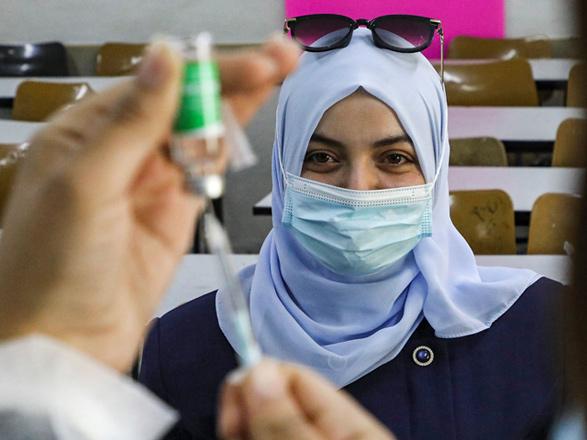- International News
- Thu-2021-04-08 | 02:44 pm

The EU's medicines regulator said Wednesday that blood clots should be listed as a rare side effect of the AstraZeneca (AZ) jab but the benefits continue to outweigh risks, as several countries battle fresh virus surges amid vaccine shortfalls.
A number of nations have suspended the use of AstraZeneca's vaccine for younger populations after it was earlier banned outright in several places over blood clot scares.
The United Kingdom on Wednesday said that people under the age of 30 should choose alternatives to the vaccine, after reporting 19 deaths from clots among people who received the shot.
The back-and-forth over the vaccine comes as countries from Germany to Ukraine and India face new waves of infections and deaths from the virus that has now killed more than 2.8 million people globally.
Governments are scrambling to secure much-needed vaccine doses, with Australia the latest nation to complain of shortages that it blamed on EU export controls.
The European Medicines Agency (EMA) said Wednesday that blood clots should be listed as a "very rare" side effect, encouraging countries to continue its use.
The announcement came after EMA's safety committee examined reports of blood clots, but EMA chief Emer Cooke said no particular risk factor had been identified and the clots could be linked to an immune response to the vaccine.
"Specific risk factors such as age, gender or medical history have not been able to be confirmed, as the rare events are seen in all ages," she told a news conference.
"The benefits of the AstraZeneca vaccine in preventing COVID-19 overall outweigh the risk of side effects," she added.
"It is saving lives."
Canada, France, Germany and The Netherlands are among several countries that are not recommending the shot for younger people.
Britain urged people under 30 to use other vaccines besides AstraZeneca, after reporting 79 blood clots and 19 deaths among 20 million doses given. It did not say how many people had been given the AstraZeneca vaccine.
AstraZeneca’s vaccine has been administered in at least 111 countries, more than any of its rivals, according to AFP data. It is being used in wealthier countries and poor nations, largely as part of the WHO-backed Covax scheme to ensure equitable access to vaccines.
The controversy surrounding the jab has marred a global vaccine rollout that governments hope will help countries emerge from a pandemic that has ravaged the global economy and subjected much of humanity to some form of confinement.
In Germany, Chancellor Angela Merkel expressed support for a snap lockdown to stem rising cases, after decentralised measures failed to quell outbreaks.
Hard-hit France imposed tighter measures this week, while Ukraine on Wednesday reported record new deaths and hospitalisations after tightening measures in the capital.
"It is no exaggeration to describe the situation as critical,” said Kiev Mayor Vitali Klitschko, warning that the city’s hospitals would run out of beds "very soon”.
India, which registered a 24-hour record of almost 116,000 new cases on Wednesday, said it too would rollout tougher curbs with new curfews in place in 20 cities, including the capital New Delhi.
As millions readied for new anti-virus rules in India, the country’s Serum Institute — the world’s largest COVID vaccine maker — said it needed financial help after the government imposed export restrictions to secure much-needed doses at home.
Production capacity at the Serum Institute of India — which makes the AstraZeneca jab — is now "very stressed, to put it quite frankly”, the company’s CEO Adar Poonawalla said.
Australia was facing vaccine woes of its own, after just 700,000 of a contracted 3.8 million doses of the AstraZeneca vaccine were delivered.
Prime Minister Scott Morrison blamed the EU for the shortages, accusing the bloc of "strict export controls”.
"It’s not a dispute. It’s not a conflict. It’s not an argument. It’s not a clash. It’s just a simple fact.”
More than 692 million doses of coronavirus vaccines have been administered globally, according to an AFP tally, with just a handful of countries leading the pack by a wide margin.
Israel has inoculated 61 per cent of its people with one dose, while the US has administered 33 per cent with a first shot.
Amnesty International said in its annual report Wednesday that wealthy countries are failing a "rudimentary” test of global solidarity by hoarding COVID vaccines.
"The richest countries have effected a near-monopoly of the world’s supply of vaccines, leaving countries with the fewest resources to face the worst health and human rights outcomes,” said Amnesty boss Agnes Callamard.
Echoing calls to help hard-hit nations, G-20 finance ministers and central bankers backed a proposal from the International Monetary Fund to boost its reserve offerings by $650 billion to help poor countries hit by coronavirus.
Meanwhile in the United Kingdom, where nearly 47 per cent of people have received a first dose, health workers started rolling out the Moderna jab, the third approved after AstraZeneca and Pfizer.
The first person to get the Moderna shot in Britain said she was relieved to finally feel safe again.
"I’m an unpaid carer for my grandmother so it is very important to me that I get it, so I can care for her properly and safely,” said 24-year-old Elle Taylor.













